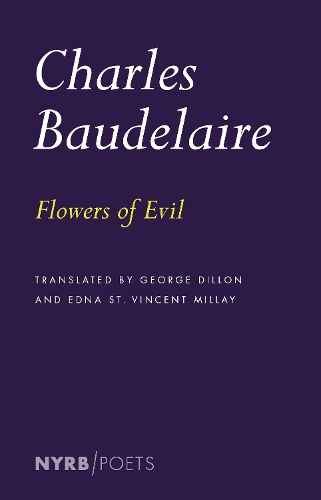
Flowers of Evil
(Paperback)
Publishing Details
Flowers of Evil
By (Author) Charles Baudelaire
By (author) George Dillon
New York Review Books
NYRB Poets
18th June 2024
21st May 2024
United States
Classifications
Physical Properties
Paperback
292
Width 114mm, Height 178mm
Description
Seminal, inspired translations of one of the greatest poets of all time by Edna St. Vincent Millay and George Dillon, now available in a sleek new edition. It's no exaggeration to say that Charles Baudelaire invented modern poetry. Flowers of Evil has been a bible for poets from Rimbaud to T.S. Eliot to Edna St. Vincent Millay, who, with Georges Dillon, brought out an inspired rhymed version of the book in 1936. Here it is reprinted, with the French originals, for the first time in many years. Millay and Dillon's versions are virtuosic in their handling of rhyme and meter, and their take on the Flowers of Evil as a whole is among the most persuasive English, capturing in flowing lines comparable to Baudelaire's the tortured consciousness and troubling sensuality that are his opulent music's counterpart. The book also allows readers a new appreciation of the range of Millay's own achievement as a poet and translator.
Author Bio
Charles Baudelaire (1821-1867) was a French poet, translator, and critic. He studied law in his youth but went on to pursue a literary career and a bohemian lifestyle in Paris, changing hairstyles, lovers, and residences as he racked up debt. He began his literary career as an art critic and started publishing his poetry in the mid-1840s. In 1857, he published the first edition of his most famous work, The Flowers of Evil, a work that revealed his familiarity with and affection toward the urban life of Paris. Baudelaire's writing earned him a reputation as a "cursed poet," a reputation he celebrated, and parts of The Flowers of Evil remained censored by the French government until 1949. Edna St. Vincent Millay (1892-1950) was an American poet and playwright. Throughout her career, Millay was considered one of the most successful and revered poets of her time, known for both her dramatic works and her lyric verse. Some of her most famous poetry collections include A Few Figs From Thistles, Second April, and The Ballad of the Harp-Weaver. She won the Pulitzer Prize in 1923 for her poem "Ballad of the Harp-Weaver," making her the first woman to win the award. George Dillon (1906-1968) was a poet and editor. Dillon edited Poetry magazine from 1937 through 1949 and won a Pulitzer Prize in 1932 for his collection The Flowering Stone. Today he is perhaps best known for being one of Edna St. Vincent Millay's many lovers.
